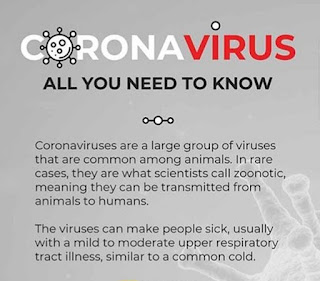Coronaviruses are part of a family of viruses that
can affect humans and are commonly found in many different species of animals.
Symptoms are usually those of the common cold and can include a dry cough,
fever, or chills. More severe cases can occur in individuals with weakened
immune systems and the elderly.
Coronaviruses may affect people or animals. Other
coronaviruses leading to outbreaks in the past include the Middle East
Respiratory Syndrome coronavirus (MERS) identified in 2012 and the Severe Acute
Respiratory Syndrome (SARS-CoV) outbreak identified in 2003.
Common Symptoms of Coronavirus
The symptoms of most coronaviruses are similar to
any other upper respiratory infection, including runny
nose, coughing, sore throat, and sometimes a fever. In most cases,
you won't know whether you have a coronavirus or a different cold-causing
virus, such as rhinovirus.
You could get lab tests, including nose and throat cultures and blood work, to find out whether your cold was caused by a coronavirus, but there's no reason to. The test results wouldn't change how you treat your symptoms, which typically go away in a few days.
But if a coronavirus infection spreads to the lower
respiratory tract (your windpipe and your lungs), it can
cause pneumonia, especially in older people, people with heart
disease, or people with weakened immune systems.
What to Do About Coronavirus
There is no vaccine for coronavirus. To help prevent a coronavirus infection, do the same things you do to avoid the common cold:
ü Wash
your hands thoroughly with soap and warm water or with an alcohol-based
hand sanitizer.
ü Keep
your hands and fingers away from your eyes, nose, and mouth.
ü Avoid
close contact with people who are infected.
You treat a coronavirus infection the same way you
treat a cold:
ü Get
plenty of rest.
ü Drink
fluids.
ü Take
over-the-counter medicine for a sore throat and fever. But don't
give aspirin to children or teens younger than 19;
use ibuprofen or acetaminophen instead.
A humidifier or steamy shower can also help ease a
sore and scratchy throat.
Even when a coronavirus causes MERS or SARS in other
countries, the kind of coronavirus infection common in the U.S. isn't a serious
threat for an otherwise healthy adult. If you get sick, treat your symptoms and
contact a doctor if they get worse or don't go away.


No comments:
Post a Comment
Best Blog, Good work Admin